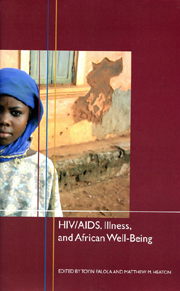Book contents
- Frontmatter
- Contents
- Acknowledgments
- Part I Context
- Overview to HIV/AIDS, Illness, and African Well-Being
- Introduction: The Evolution of Disease in Africa
- 1 The Infectious Continent: Africa, Disease, and the Western Imagination
- Part II Illness Case Studies
- Part III Globalization, Development, and Health
- Part IV HIV/AIDS
- List of Contributors
- Index
- Rochester Studies in African History and the Diaspora
Introduction: The Evolution of Disease in Africa
from Part I - Context
Published online by Cambridge University Press: 05 February 2013
- Frontmatter
- Contents
- Acknowledgments
- Part I Context
- Overview to HIV/AIDS, Illness, and African Well-Being
- Introduction: The Evolution of Disease in Africa
- 1 The Infectious Continent: Africa, Disease, and the Western Imagination
- Part II Illness Case Studies
- Part III Globalization, Development, and Health
- Part IV HIV/AIDS
- List of Contributors
- Index
- Rochester Studies in African History and the Diaspora
Summary
The etiology of human ailments is of interest to those who strive to cure them, but also to those who suffer as patients, their empathizers, or their dependents. When maladies are not inflicted through physical injury, their source as well as the rationale for victim selection is frequently obscure. Some illnesses arise from within, due to malfunction or wear and tear of aging organs. Other, often more dreaded diseases encroach upon unsuspecting, appropriately situated, and susceptible individuals. External etiologic agents may be natural and artificial chemicals, which can damage organs or induce cancers, or parasitic forms of life. Just as humans have learned to move away from the most obnoxious chemicals, human bodies have necessarily evolved strategies to keep out or destroy small, unseen but disease-causing creatures, collectively called pathogens. A greater diversity exists among these microscopic forms of life than among those organisms that can be sighted by the human eye, and pathogens are continuously and rapidly adapting to existing and new niches. The consequence is that, other than perhaps geophysical disasters, infectious diseases have killed more humans than any other cause of death throughout time. Indeed, until the late nineteenth century, infection was the most common cause of death in virtually every part of the world.
Infectious disease control is pivotal to existence, and humans have long attempted to unravel the etiology of contagious diseases by experiment and by thought. Virtually every culture has at one time embraced the hypothesis that infection arises spontaneously or has a cosmic or nonphysical origin.
- Type
- Chapter
- Information
- HIV/AIDS, Illness, and African Well-Being , pp. 16 - 27Publisher: Boydell & BrewerPrint publication year: 2007

